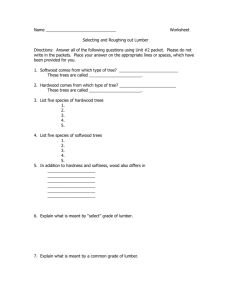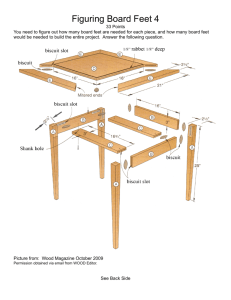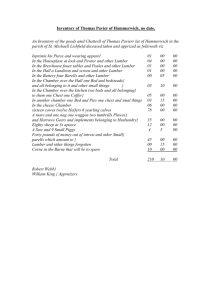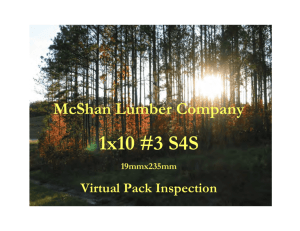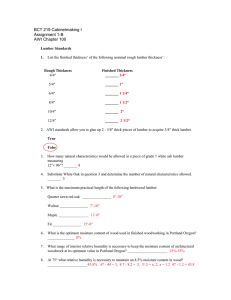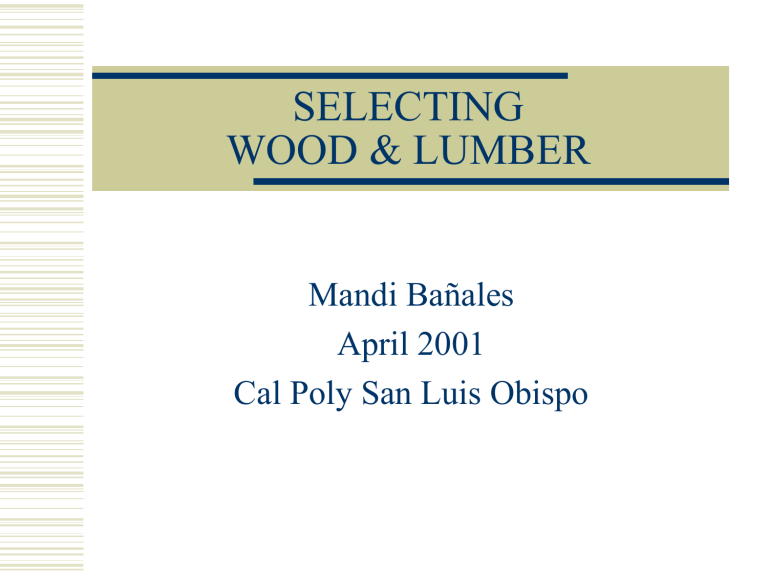
SELECTING WOOD & LUMBER Mandi Bañales April 2001 Cal Poly San Luis Obispo KINDS OF WOOD Softwood comes from needle leaf, evergreen trees called conifers Hardwood comes from broadleaf trees that lose their leaves each fall season, called deciduous trees. Kinds of Woods Softwood types White pine Easy to work with, straight Yellow pine Wear resistant and tough Fir Light, straight, and strong Redwood Excellent decay resistance Cedar Light and easy to split Spruce Light, straight, strong and resonant Uses of Softwood Types White pine – shelving, interior finish, exterior trim, and door frames Yellow pine – benches, stairs, where semi-hard surface is desired Fir – framing members, siding, sheathing, and gates Redwood – posts, fences, patios, and siding Cedar – fence posts, sills, and shingles Spruce – aviation and musical instruments HARDWOOD TYPES Oak Tough, strong, and open-grained Walnut Beautiful, brown, open grain Maple Very durable and light-grained Mahogany Grain is straight to interlocked, texture is medium to coarse and uniform Straight, close grain and a fine, even texture Birch Hardwood Identification OAK BIRCH WALNUT MAPLE MAHAGONY Uses of Hardwood Types Oak - used in floors, interior finish, barrels, furniture Walnut – used for fine furniture, boat building, clock cases Maple – used for floors, interior finish, furniture, and guitar necks Mahogany – is used for fine furniture, boat interiors, pianos, Birch – used for surface veneer on cabinets and doors, Furniture, high-grade joinery, high-grade plywood Log Cutting Method #1 Slash sawing cuts a log so that the annular rings form an angle of less than 45 degrees with the surface of the lumber. Softwood lumber cut in this fashion is referred to as flatgrained Hardwood lumber cut in this fashion is referred to as plain-sawed Log Cutting Method #2 Quarter sawing cuts a log so that the annular rings form an angle of more than 45 degrees with the surface of the lumber. Softwood lumber cut in this fashion is referred to as edge-grained Hardwood lumber cut in this fashion is referred to as quarter-sawed FINISHES Rough lumber comes directly from the sawmill unplaned and varying in dimensions from piece to piece S2S - lumber surfaced on two sides-all pieces to have the same thickness, but varying widths S4S – Lumber surfaced on four sides allowing exact dimension from piece to piece. Special Notes for FINISHES THE ACTUAL SIZES ARE ½ INCH LESS THAN THE NOMINAL SIZES! Example: the actual size of a 2 x 4 is Only 1 1/2” x 3 1/2” THE BASIS OF LUMBER GRADES APPEARANCE AND SOUNDNESS OF WOOD Examples of Lumber Grades. These would be on the wood at time of purchase. DEFECT VS. BLEMISH A Lumber defect is an irregularity in or on the wood that reduces its strength, durability, or usefulness A Lumber blemish is a defect that impairs only the wood’s appearance Common Lumber Defects Knots Holes Splits Shakes Pitch pockets Honey combing Wane Decay Blue Stain Warp Basic Lumber Grades Select – Grades A & B suitable for natural finishes Grades C & D are suitable for paint finishes Common – Common #1, 2, and 3 are suitable for use without waste Common # 4 and 5 are suitable for use permitting waste PLYWOOD GRADES N Veneer with a smooth surface suitable for natural finishes A Is a veneer with a smooth surface suitable for painting B Is a veneer with a solid surface C Plugged is an improved C veneer with splits limited to 1/8 inch width, and knot holes and bore holes limited to ¼ x1/2 inch C Is a veneer with tight knots to 1 ½ inch D Is a veneer with knots and knot holes to 2 ½ inch width across the grain which is limited to interior, exposure 1 and 2 panels G2S Means the veneer is good on two sides G1S Means the veneer is good on only one side Factors to Consider when Selecting Lumber Quality construction does not require that all the lumber be of the best grade Several grades of lumber may be appropriate in a single structure Good economical construction requires the proper use of the lowest grade lumber suitable for the purpose
